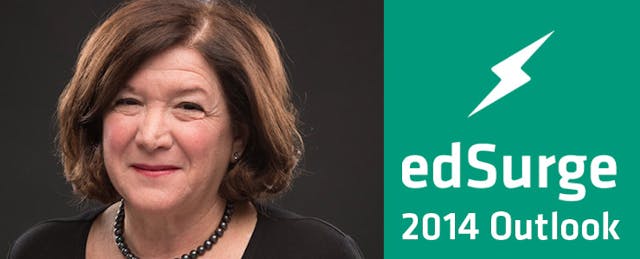At EdSurge, we span the spectrum between educators and entrepreneurs. We kicked off our EdSurge 2014 Outlooks series with Chris Dede, a Harvard University academic and digital learning aficionado. Fittingly, we wrap the series up today with a University of Pennsylvania director who specializes in edtech entrepreneurship.
Dr. Barbara Kurshan (Bobbi for short) is the Executive Director of Academic Innovation and Senior Fellow in Education at the University of Pennsylvania Graduate School of Education. She’s responsible for programming like the Milken-Penn GSE Educational Business Plan Competition, following her years as an edtech entrepreneur with organizations like Educorps Consultants Corporation.
Kurshan has a knowledge of funding strategies and startup culture, so we started by asking her about edtech entrepreneurship trends in 2013. Her response? Despite the enthusiasm for edtech, companies are not getting enough funding or building sustainably.
Kurshan cites three main issues as blame. First, companies don’t understand the research that may support or negate their product’s intended effect. “They build a product and think that it’s wonderful, but they built it in red when all the research says blue,” Kurshan starts off.
Edtech startups don’t just miss the research, however. Kurshan explains: “Companies also don’t understand the competition. They talk about their companies like sliced bread, but i remind them that there are similar companies.” And while companies struggle to differentiate themselves from competitors, they go through precious resources to the point where they “don’t have enough time or money.”
The future is bright, however. In lieu of these 2013 trends, Kurshan is hopeful for 2014 and offers three key predictions for areas where entrepreneurs can find success.
1. Data visualization
This is a song that several of our Outlookers have sung. Kurshan agrees that the need for data visualization is a must.
“There’s a lot of big data. InBloom is trying to make that content available. Amplify is looking into it. You’ll see a lot of companies trying to make the data easier to understand and use,” Kurshan forecasts.
2. Open educational resources (OERs) and content management
“I think you’re going to see a lot of effort on how to make OERs a viable business model,” Kurshan predicts. “I think you’ll see big publishers get in to have better distribution of OERs, better writing of assessments, better understanding of psychometrics, and knowledge of the cost of investment to build content.”
Being a big publisher isn’t a necessity, however. Kurshan muses that this is a big opportunity for startups as--with a word of caution. “Don’t destroy the value of OER,” she begins, “but enhance the value and open up opportunity around it.”
3. Tools that support teachers in building collections of content
Lastly, Kurshan predicts the development of more tools that support teachers in building and storing collections of information. Her reasoning? Instructional designers are not teachers (and vice versa).
“We need tools that help teachers understand how to build instruction tools from content and pedagogical perspective,” she states. “Amazon got TenMarks not because of content, but because of the ability to aggregate the content, making it easy for teachers to put content together for individualized use.”
Along with her suggestions for product developments, Kurshan gives some advice to 2014’s budding edtech entrepreneurs, going back to the issues she witnessed in 2013.
“Know your market, know the research, and make sure you understand that it's going to take more time/money than you think,” Kurshan shares. And most importantly? “If you aren’t having fun, this isn’t the business for you.”


